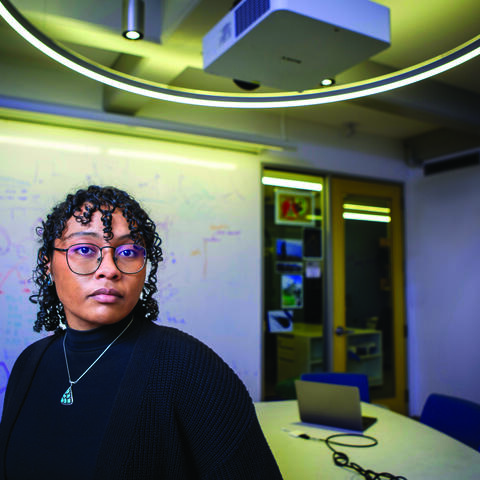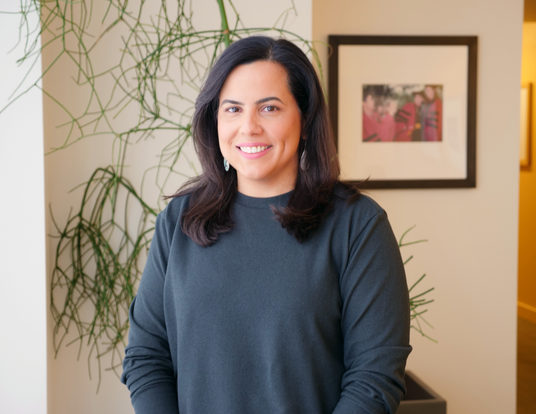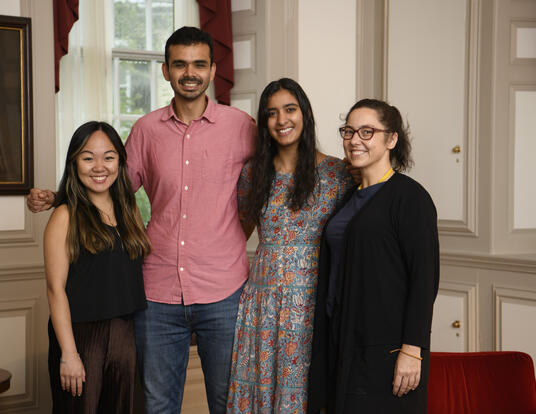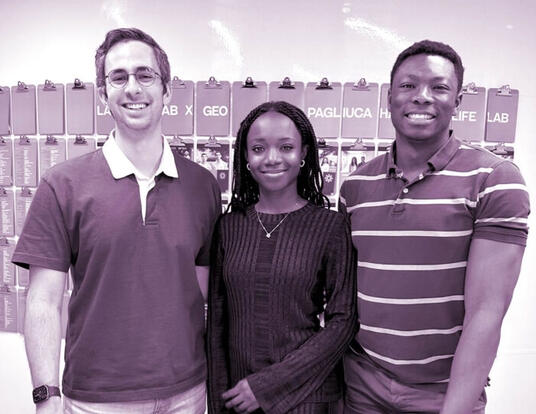Diverse Portfolio
New ODMA staff support inclusion and belonging in PhD programs across the University
Earlier this winter, the Office of Diversity and Minority Affairs (ODMA) announced the addition of new staff members Clarisse Wells, PhD ’21, and Xavier du Maine, PhD ’22. As associate director of diversity and minority affairs, Wells, who received their PhD in South Asian studies, will oversee equity, diversity, inclusion, and belonging efforts across GSAS programs, with special emphasis on the recruitment and retention of students in the social sciences and humanities. du Maine, who is to receive his PhD in Biological and Biomedical Sciences, will as assistant director of diversity and inclusion focus on supporting and coordinating recruitment efforts for Harvard Integrated Life Sciences programs. GSAS’s Office of Communications spoke with Wells and du Maine recently about their new roles, their aspirations for their work at ODMA, and what it means to advance diversity, equity, and inclusion at the School.
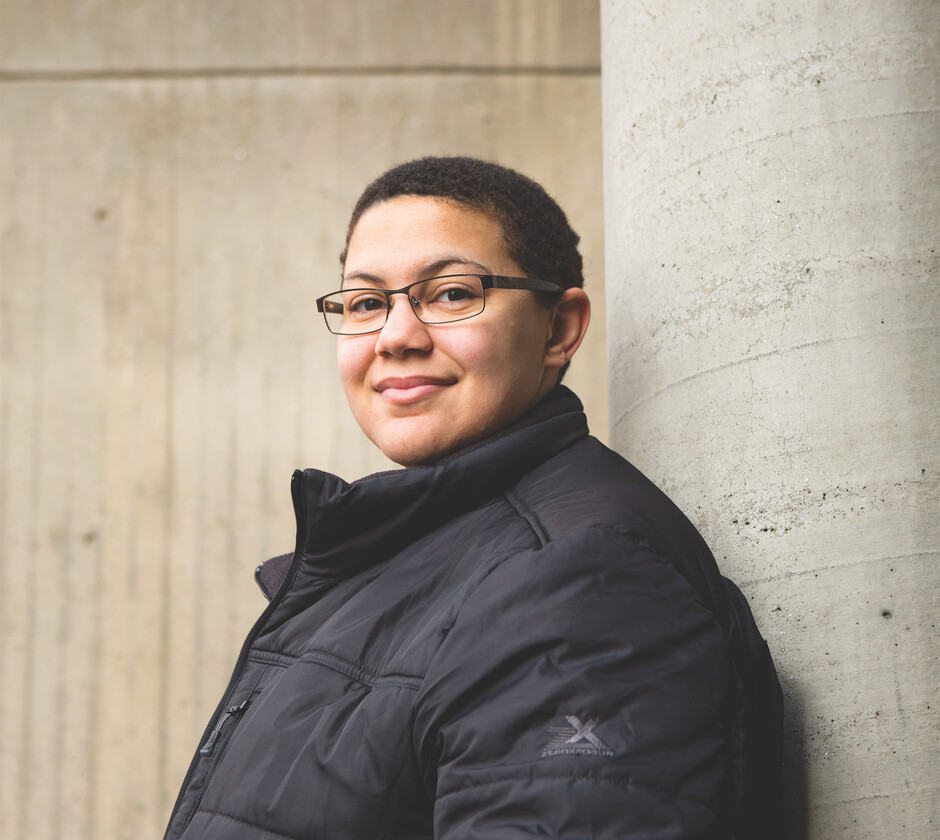
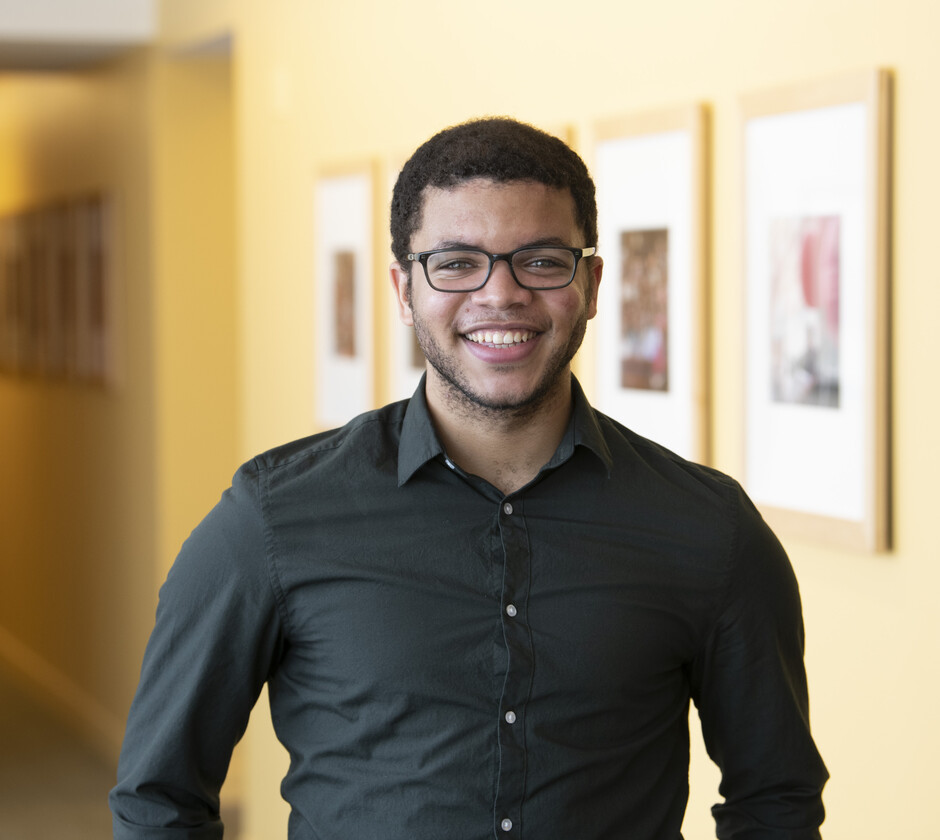
GSAS Communications: What are the specific program areas, issues, or populations you’ll focus on as part of the team at ODMA?
Clarisse Wells: My role is fundamentally about supporting graduate students of color and LGBTQIA+ students, and just making sure that they have every opportunity to achieve their goals, that every space is made available to them, and that there's a sustained level of support. Having just graduated from GSAS myself, it means a lot to me to have the opportunity to try and improve the spaces I used to be in.
My focus in terms of program areas will be the social sciences and humanities. I’m excited and optimistic about the programming we can create. We want to make sure that the way people navigate Harvard and academia, from the start to the finish, is as smooth and frictionless as possible. That means having people from a wide variety of backgrounds and experiences—whether faculty or administrators—working hand-in-hand to make sure that everything comes together for those we serve.
Xavier du Maine: My position is more specifically focused on Harvard Integrated Life Sciences. I support our 14 PhD programs in that area. It’s exciting to me because I recently finished my doctoral work in the life sciences, so I’m familiar with the process of applying to a program, trying to be integrated into it at the very beginning, and then going through the ups and downs. There are so many unwritten rules for how to succeed in this sort of environment. I want to help clarify these rules and then find ways for students to learn about them instead of having to figure everything out on their own. In some cases, I want to eliminate or change the rules altogether.
I’ll work on recruitment and also retention efforts. You can't do recruitment well if you don't understand the challenges that students face later on down the road. I’ll also be working on expanding partnerships not only across the University but also at historically black colleges and universities, Hispanic-serving institutions, and tribal colleges and universities. We can learn a lot from them about how best to serve and support our own students.
Communications: You both have aspirations as researchers and scholars. Why did you want to work with ODMA at this point in your career? You’ve mentioned your student experiences. Can you talk about those more specifically?
Wells: Ever since I came to Harvard—and even before, when I was at the University of Wisconsin for my master’s degree—I was always involved with student organizing and the effort to create a livable, sustainable, and healthy experience in graduate school. Being involved in various initiatives around Title IX [which protects people from discrimination based on sex in education programs or activities that receive federal financial assistance], supporting survivors of sexual assault, and creating space for students of color have all been intrinsic to my experience of academia. They’re also the reasons I wanted to be a scholar to begin with—philosophies of race and gender. So, I don't see this work and my scholarship as being separated.
In terms of my student experience as someone who’s a person of color and queer, there were a lot of people at GSAS who were there for each other—especially graduate students who collectively recognized the experience we were all having and supported each other. Certain faculty understood too and went above and beyond to support the people they were mentoring.
That said, it's not enough. There’s an institutional obligation to provide a space that is not just inclusive but supportive; to provide opportunities not just for academic success but also for all students to thrive. It’s not enough for people just to get by. Everyone should be able to blossom here—both as a scholar and a human being. I’m very excited about the possibilities of creating that kind of environment at GSAS.
du Maine: For me, the journey starts in high school. I had this amazing anatomy and physiology teacher. She encouraged me to apply to a summer research outreach program aimed at students underrepresented in biomedical research at Washington University School of Medicine. That’s when I decided I wanted to get a PhD. That program gave me the exposure I needed. It inspired me to do research nearly every summer right up to when I entered graduate school.
When I got to Harvard, I wanted to be involved in outreach programs like the one that had such an impact on me. So, I got involved in outreach during my first couple of years here, including the Health Professions Recruitment and Exposure Program (HPREP) which brings in low-income, first-generation, and underrepresented minority high school students from the Boston area. I co-led the mentoring team. We partnered with the Harvard Graduate School of Education Equity & Inclusion Fellows to provide mentors with training on how to engage and mentor HPREP students across a host of differences in identity and privilege.
That experience made me wonder why we couldn’t have those sorts of conversations at GSAS as well—about learning from each other and fostering an inclusive environment. I and some other BBS students of color started the Culture and Community workshops to provide a kind of DIB (diversity, inclusion, and belonging) orientation for incoming students. Wanting to scale that up was what pushed me to become an ODMA diversity and inclusion fellow. That was a taste of the positive impact that the administrative side of things can have on students. That experience helped me to decide that this work was what I wanted to do after graduation.
Communications: Finally, what would success look like? How do you hope to advance equity, diversity, inclusion, and belonging at GSAS in the months ahead?
Wells: I want to do all I can to increase resources for LGBTQIA+ students and advance that priority as part of GSAS’s overall DIB effort.
du Maine: A huge focus of mine is going to be recruitment. That means encouraging more underrepresented students to apply to GSAS and improving matriculation. I’ll also be working on outreach and pipeline efforts by helping to coordinate the Summer Honors Undergraduate Research Program, which is a special treat since I’m an alum of the program.
In the months ahead, I’d like to find new ways to work with faculty on DIB. They are the key stakeholders at the University for ensuring the success of these efforts—more than students and postdocs who come and go, even more than some long-serving staff who might not have as much power or influence. When faculty champion and invest in this work, then it has the sustainability and the momentum that it needs to transform the community we all live, learn, and work in.
Photos by Tony Rinaldo and John Soares
Get the Latest Updates
Join Our Newsletter
Subscribe to Colloquy Podcast
Simplecast Stitcher


